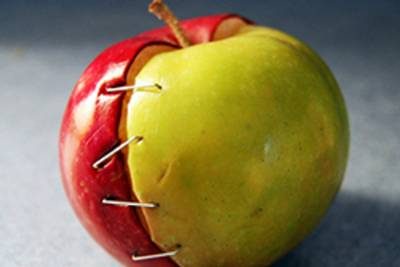You may remember the National GMO Labeling Bill that the Senate passed in July 2016. Whole Foods co-CEO Walter Robb and other high-profile supporters hyped it as a long-earned success for GMO labeling advocates; meanwhile, the actual GMO labeling community felt that it was duped.
To many, the bill felt like a huge concession to the GMO industry—an attempt to demand only the bare minimum from these manufacturers, while undermining progress toward any real GMO labeling legislation.
The bill nullified Vermont’s much more comprehensive labeling laws, and replaced them with vague and weak nationwide laws that make actual labeling very easy for manufacturers to avoid.
For example, companies are permitted to use only QR codes in lieu of any easily visible labeling—and this trick is already being put into practice.
Okanagan Specialty Fruits (OSF), a GM food developer based in Canada, is beginning its US rollout of non-browning Arctic apples, and they will only be identified as genetically modified through a QR code.
The company knows exactly what it’s doing; founder and president Neal Carter even admitted that he doesn’t want their new product to be “demonized” because of a “big GM sticker.”
To make matters worse, the apples will be phased into undisclosed stores across the American Midwest (only ten stores at first, and then more if the product proves its popularity). Luckily, you’ll be able to pick them out easily—they’ll be sold pre-cut, and they won’t display any browning even after sitting on produce shelves for extended periods of time.
Useless “innovation” and needless risk
The non-browning apple perfectly showcases how inane the GMO industry really is. Okanagan Specialty Fruits has dedicated extensive resources toward suppressing a natural chemical reaction, namely the enzyme polyphenol oxidase, which causes apples to turn brown once they’ve been cut. They’ve simply sought out the gene that controls the expression of this enzyme and blocked it.
The company obviously claims that their product is perfectly safe, and it was approved for sale and consumption by both the US Department of Agriculture and Health Canada. But we can’t possibly know the long-term risks of suppressing natural chemical reactions—and suppression usually doesn’t lead to good things (e.g. closing off pores and suppressing sweat with deodorants can lead to cancer, and suppressing symptoms of illness with OTC medications can actually prolong its overall duration).
“Genetically Modified foods can create unpredictable, hard-to-detect side effects, including allergies, new diseases, and nutritional problems.
Even if Okanagan Specialty Fruits has found nothing especially dangerous about their product, why take the risk that comes from messing with natural processes, all for the silly convenience of apples that don’t turn brown?
According to the Institute for Responsible Technology, FDA scientists have repeatedly warned that “GM foods can create unpredictable, hard-to-detect side effects, including allergies, new diseases, and nutritional problems. They urged long-term safety studies, but were ignored.”[1]
The American Academy of Environmental Medicine also continues to publicize the evident dangers of GMO’s, arguing that “several animal studies indicate serious health risks associated with genetically modified (GM) food, including infertility, immune problems, accelerated aging, faulty insulin regulation, and changes in major organs and the gastrointestinal system. The AAEM has asked physicians to advise all patients to avoid GM foods.”[2]
Despite such credible evidence, companies like Okanagan Specialty Fruits are blundering on; Neal Carter even dismisses anti-GMO research as “pseudoscience” and “paranoia.”
But the public recognizes something isn’t right with GM foods
All the whitewashing and sneaky labeling in the world can’t change one fact, though: GMO opposition is still strong and widespread.
Despite attempts to avoid being “demonized” (i.e. by hiding the truth from consumers), OSF is facing massive disapproval in their own backyard. A poll commissioned by the British Columbia Fruit Grower’s Association revealed that 69% opposed the approval of the non-browning apple (and that’s just counting the people who participated in the poll).
A poll commissioned by the British Columbia Fruit Grower’s Association revealed that 69% opposed the approval of the non-browning apple
Seventeen different Canadian advocacy groups have joined forces to form the Canadian Bio-Technology Action Network, and the organization is touring communities across the country to speak out against the Arctic apple.
This kind of public backlash is exactly what’s needed, because governments are not going to protect us from the dangers of GM foods.
It seems that GM food companies are going to press on with their risky science experiments for the foreseeable future, but this doesn’t mean that you have to be part of their experiments. It’s important to stem the tide of GM food development while we still can, because some experts worry that crop cross-pollination could eventually lead to a world full of nothing but GM foods.
As the Arctic apple’s trial run shows us, the most powerful tool available to us is our buying power as consumers. If enough people simply refuse to purchase GM foods, manufacturers will have little incentive to keep making them.
They might try to hide them beneath QR codes and sneaky marketing at first, but eventually they’ll have to own up to the truth: foods are best in their natural, unmodified form—and that’s the way the public wants them.
References
[1] http://responsibletechnology.org/gmo-education/health-risks/






